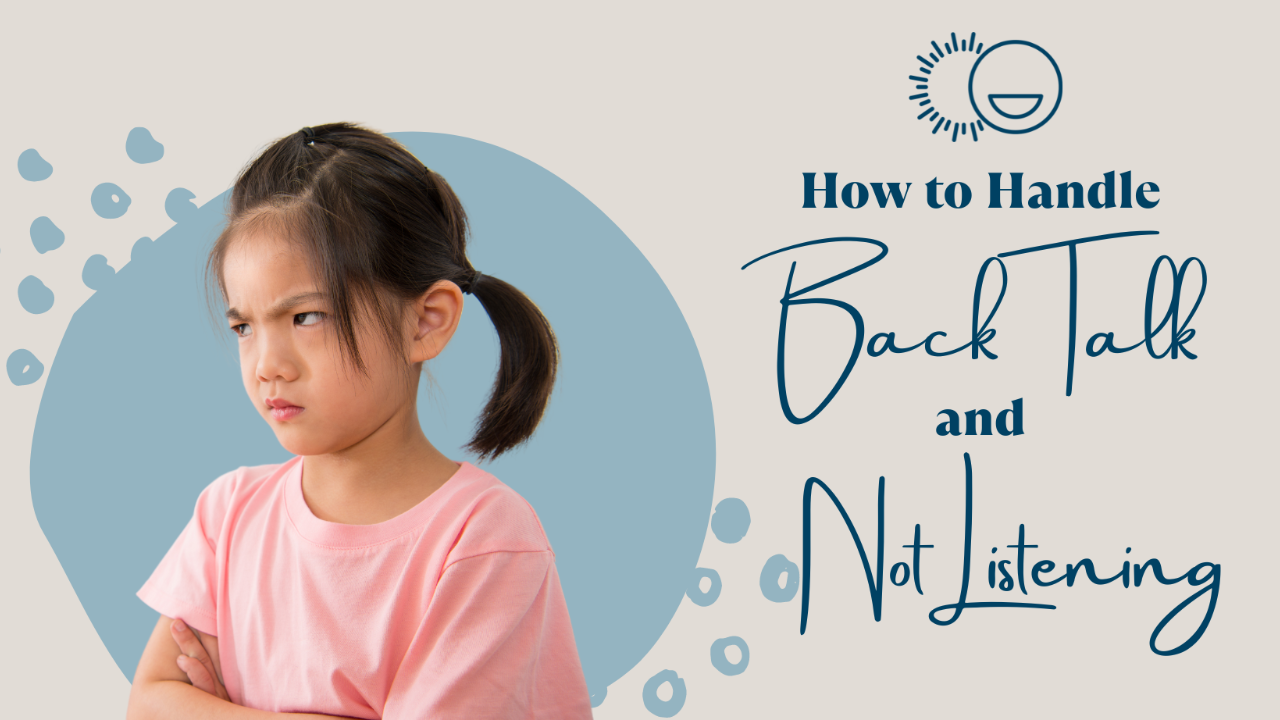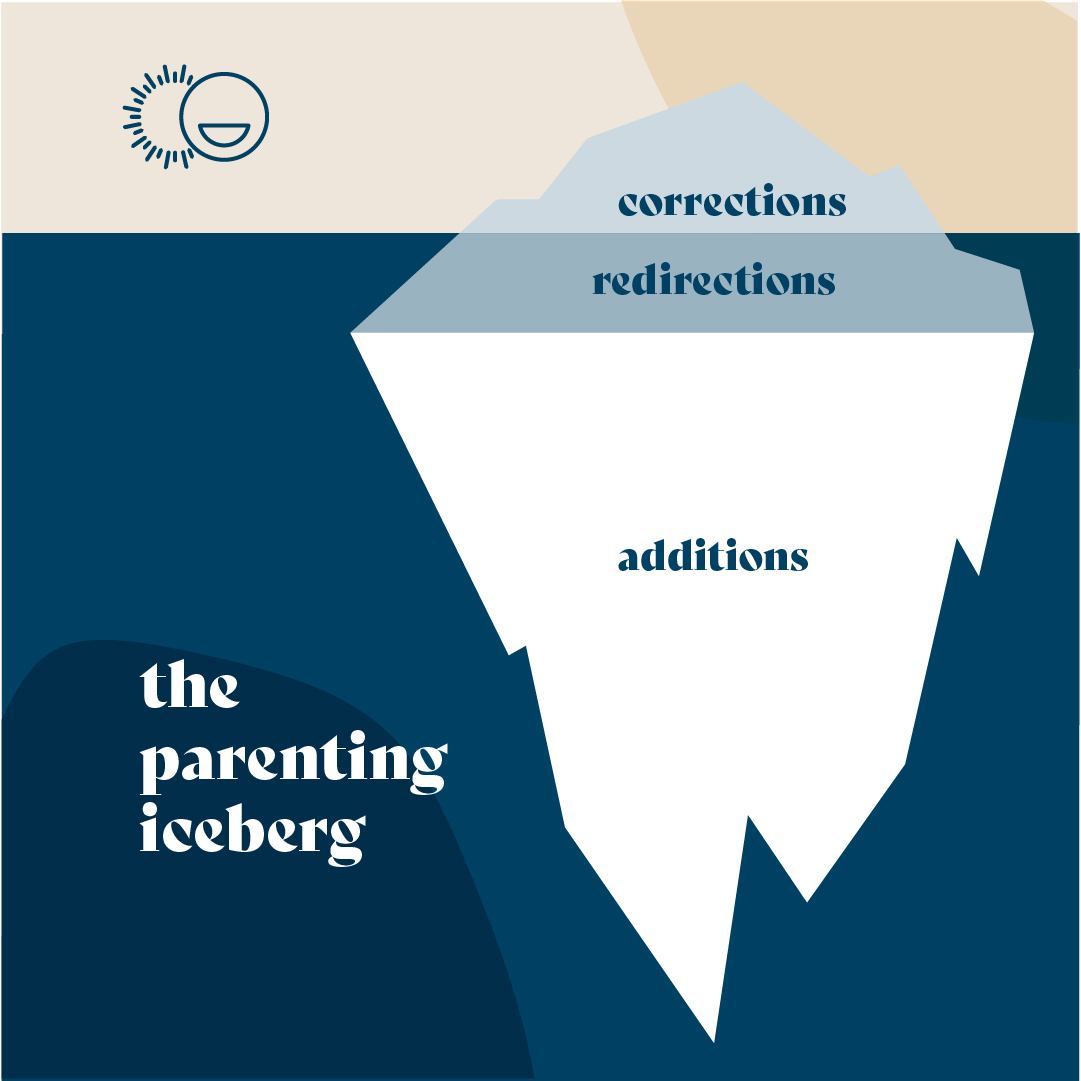How to Handle Back Talk and Not Listening
Mar 01, 2023
One of the biggest questions and concerns we get from parents is related to their child talking back to them and not listening. While we want our children to listen to us the first time, we also want them to be able to have discussions with us where they are allowed to voice their opinion and feelings. How do we accomplish this? We are going to ensure we have a strong parent-child relationship first, so we can then teach our children how to navigate their emotions, control their voice, and learn how to disagree respectfully, but still follow directions.
To create a culture of respect in our home, parents need to be modeling appropriate behavior and responses. For parents, this means speaking respectfully to each other and controlling our tone of voice. We get it, this can sometimes be the hardest! There is something particularly triggering about our child being so bold with their attitude!
Just like we have big feelings, our kids do as well, but with significantly less brain development and skills to handle these feelings. Children are more likely than adults to act impulsively through both physical actions and their words. This is helpful in setting an expectation that we will likely encounter this behavior, but can address it! As parents, we can balance both a gracious response and still be consistent with our boundaries and limitations.
Here are our tips for parents in these situations:
- Remain calm. This is the quickest way to take the air out of a hot air balloon. Remember, in these moments we need to focus on modeling appropriate behavior and keep the situation from escalating. If we immediately start yelling or speaking rudely back to them, we just got stuck with them. Sometimes, our children can push us to the point where we throw our hands in the air and say “Nevermind, I will just do it myself!” When this happens, your child has just learned that if they engage in an argument long enough, they get out of doing what you have asked. When you feel the urge to yell, try this: If you feel the urge to yell, drop your voice down lower, which often gets their attention faster than yelling, and helps you stay in control.
- Try not to take it personally. When our kids are using an angry voice, and maybe even screaming, remember they are directing this to the issue – not necessarily to you. And, it is totally normal for you as the parent to get the brunt of behavioral issues compared with other environments. Again, that does not make the behavior acceptable, but this is a common developmental and parenting problem!
- Stay focused on the issue. If your child is responding out of anger due to a limit, such as having to turn off the television or completing a chore, don’t let their behavior get you sidetracked. Yes, we can respond to their tone, but often times parents get so upset about their child’s response it turns into a different discipline issue rather than the children listening to the request which made them upset in the first place.
- Validate the feeling behind the tone. How many times have we even as adults said, “It’s not what you said, it’s how you said it.” Many times, our kids are just feeling frustrated, disappointed, or angry, and this comes out in their tone of voice. It is okay to acknowledge their feeling without feeling like you are losing your ground or authority – this just makes us empathetic.
- Give permission for your child to state their feelings or view point. If your child is disagreeing but speaking respectfully, give them your attention. Hear their perspective and paraphrase it back to make sure you’ve heard it correctly. Sometimes our kids have good reasons for being upset and we *may* change our mind. For example, if they can say, “I know you said to turn off the television to put up my laundry, but there is only 5 minutes left. Can I please finish?” We can also use these opportunities to model being receptive and flexible.
- Keep things simple. When your child responds with a big emotion, you can acknowledge their feeling (e.g., “I know you are upset you have to stop playing to take a bath,” “I see you are angry that you have to unload the dishwasher”), but try to keep focused on the request and solution (e.g., “You can go back to the video game as soon as the dishes are finished,” “Tuesdays are bath night”)
- It is OKAY for your children to ask why. As parents, we are making decisions for a reason (If not, we may need to rethink our request). For example, kids have to take baths to be clean and healthy, kids need to complete chores to help learn lifelong skills and perseverance, kids need to go to bed so their brains have time to rest and grow, etc. Kids are inquisitive! Try to reframe their questions as being interested, rather than questioning your authority. This is also such as simple way to redirect them while still feeling heard. Example: “But Mom!! WHY do I have to turn off the television???” Parent: “Because you just watched for 30 minutes which is what is allowed on school nights. You can watch again tomorrow.”
- Don’t continue to engage in an argument. After you have stated the reason or limit, there is not always a reason to continue to respond to continued questions or complaints. The goal here is that after responding once, the situation has been addressed and we do not want to give our child the opportunity to continue to avoid. Helpful redirecting statements can include “I have already answered that question,” “I love you too much to argue,” “I am happy to answer once your voice is calm.”
- Provide a script when needed. Sometimes our kids are so caught up in their emotions, they struggle to control their voice. For example, there have been several times where our children are working with us through this process, and do a simple re-do, but when they state their request/complaint again, it is still with a very sassy or disrespectful tone. Remember, this takes time!! In these cases, try providing your child with the words and modeling the correct tone: “A kinder way to tell me is, ‘I’m frustrated I have to clean my room before I am allowed to play a video game.’”
Keeping these things in mind, you may be thinking, “How does this work in a real life scenario?” Let’s break down a common parenting experience and how we would apply some of the skills from our Parenting 101 course to this situation:

Assuming you have handled everything needed from the additions section, here is how to use some of the redirections and corrections (Each of these skills is broken down with a video in our course – check it out to learn more!)
You ask them to stop playing as they need to clean their room/pick up their toys. They immediately begin to whine, complain, or scream “no!” Here is how you could progressively respond when they continue to be resistant and engage in back talk.
- You as a parent are going to remain calm (say in your own head “I can totally handle this. I can remain calm because I have the tools to fix the problem and support my child.”). Remember to use the opposite level of volume- if they are getting louder, you as a parent can get softer. We promise this usually makes them pause and take notice!
- Stay focused: “I see you are frustrated. You are right, it isn’t always fun to clean up. We have to pick up our toys when we are finished.”
- Use a warning word: “Uh oh!” This provides them an opportunity to know that we as a parent have outlined expectations and this is a reminder to fix their own behavior.
- Try an “If-Then” statement: “If you pick up your toys, then we can go eat lunch!”
- Give a choice: “Do you want to pick up the blocks first or the crayons?”
Sometimes cleaning up can feel like a big, overwhelming job. Breaking a task down into smaller, more manageable chunks can give them one thing to focus on and help them feel successful.
You could also turn it into a game: “Who can pick up 10 things the fastest?” This is a great way to build connection and make listening fun!
While we can help to promote cooperation, Do NOT do the entire task for your child!
If they continue to avoid and complain, here is how we would continue to redirect and then correct:
- Provide a reset if needed: “I see you are getting really frustrated. Let’s take a break for 5 minutes, but when the timer goes off, we will have to start cleaning.”
- Fun time freezes: “Mommy/Daddy has given you lots of warnings and options on how to handle this task. We won’t be able to go to the park, play games, or watch a show until our toys get picked up. Let’s get our toys picked up so we can do the next fun thing!”
If nothing else has worked, we are still going to remain calm!
- Logical consequence: “I see that you are not listening to me asking you to pick up your toys. If we cannot pick up our toys to take care of them, then we will need to put them up.” As a parent, you are then going to pick up the toys and set them aside for a specified period of time. Depending on age, this probably does not need to be more than a day or two. Make sure that they cannot access the toys or this strategy will not work!
The first time this happens, you may have to go through each of these steps and it may take way more time than you would like. That is okay. If you can focus on being calm, you are making forward progress. It is also okay to step away as a parent for a few moments, or ask your partner to take over for a period of time. If you can remain calm, consistent, and hold the boundary, each time moving forward this process will get easier and your child will need less support.
We promise this process is worth it! When you hold firm boundaries, our children know what to expect and learn to start listening with more ease.
Dr. Jordana
Want more tools? Join our parenting community!
For $13/ month, you will have access to:
- Our 90-minute Parenting 101 course, ideal for parents of kids between the ages of 1 to 12
- Monthly "Deep Dive" videos where we spend time covering common parenting concerns in more detail
- A database full of downloadable, research-based parenting information
- Weekly emails with quick, easy-to-use parenting tips and tricks
Want more like this? Transform your home with our Parenting 101 Course, and weekly tips from two Child Psychologists.
Stay connected with news and updates!
Join our mailing list to receive the latest news and updates from Mind + Child.
Don't worry, your information will not be shared.
We hate SPAM. We will never sell your information, for any reason.



